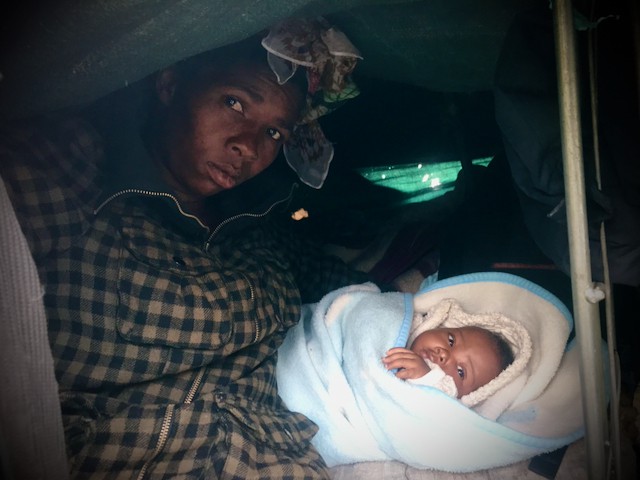Wynberg’s unwanted hounded homeless
“Everyone wants a place to put their head down” says community leader
Louise Petersen slept outside in the rain with her baby after her temporary shelter was demolished. Photo: Tariro Washinyira
- About 20 homeless families who camped out at the Wynberg taxi rank were relocated to Bonnytoun on 1 May.
- Five days later their temporary shelters were demolished by the City of Cape Town.
- When they returned to Wynberg they were driven away by taxi drivers.
- The Wynberg neighbourhood watch does not want them on its streets.
A group of abut 20 homeless families say the City of Cape Town destroyed their shelters in Bonnytoun on a cold, rainy day in May.
“Five days after building their temporary structures, the City’s Anti Land Invasion Unit (ALIU) came on 5 May and broke down about five shacks and removed some of the vagrants’ tents,” says Bonnytoun community leader Mona Allie.
They were homeless people who had previously been staying at the Wynberg taxi rank. They had relocated on 1 May to Bonnytoun through the intervention of Ward 63 Councillor Montgomery Oliver. But Oliver died on 20 April before the papers were processed and they had no proof of their right to be in Bonnytoun to show the ALIU.
When they went back to the taxi rank on 6 May, the taxi drivers chased them away, injuring some of them and burning their trolleys.
“They were told they don’t belong there and should return to Bonnytoun. When they came back here [Bonnytoun] they looked lost and helpless. It was raining and cold,” said Allie. “Everyone wants a place to put their head down.”
Some of the families have now rebuilt their shelters in Bonnytoun.
Wynberg Neighbourhood Watch chairperson Salwa Beukes called Allie “a trouble maker”.
She said, “I try to help them and they bite the hand that feeds them. Residents phone me and complain around 1am that they are making noise and I get up and go check on them but I have a day job and should be sleeping.”
“We do know that the backyarders of Bonnytoun are being charged rent … So to avoid paying rent they have started setting up shacks.”
“We are responsible for fighting crime in our sector, right? When there is crime we need to confront it, and when the City asks us for help we help where we can, but it is not our job to find people homes.”
“The people that are living on our streets are people from other areas that have homes. They are here because of choice because they don’t want to live by rules. We told them to go back to their homes,” said Beukes.
GroundUp asked the City for comment on 7 May and followed up numerous times. We were told that the City is looking into the particulars of this enquiry but no response had been forthcoming for a week.
Support independent journalism
Donate using Payfast

© 2021 GroundUp. This article is licensed under a Creative Commons Attribution-NoDerivatives 4.0 International License.
You may republish this article, so long as you credit the authors and GroundUp, and do not change the text. Please include a link back to the original article.
We put an invisible pixel in the article so that we can count traffic to republishers. All analytics tools are solely on our servers. We do not give our logs to any third party. Logs are deleted after two weeks. We do not use any IP address identifying information except to count regional traffic. We are solely interested in counting hits, not tracking users. If you republish, please do not delete the invisible pixel.

